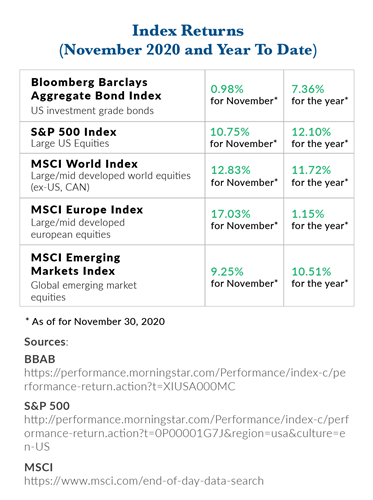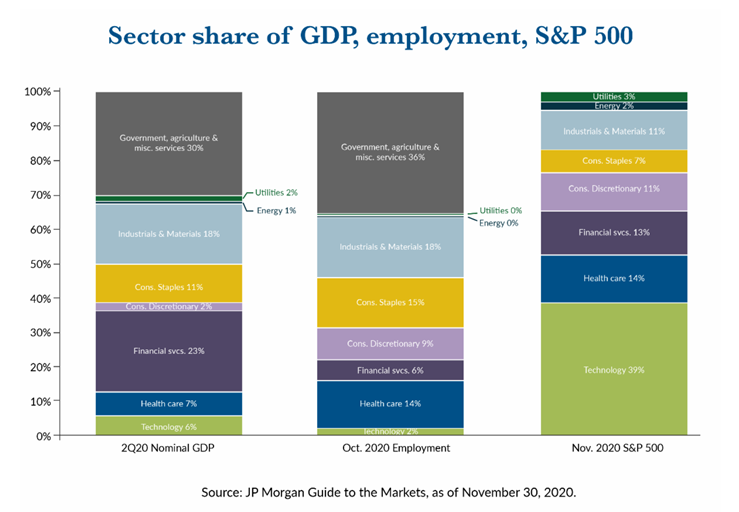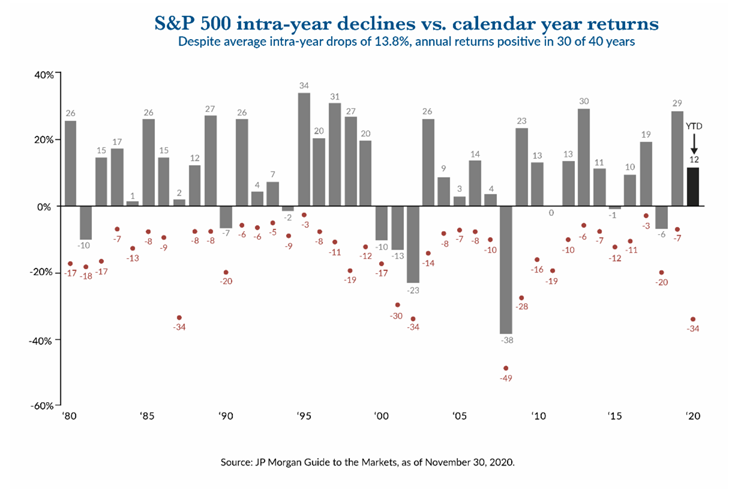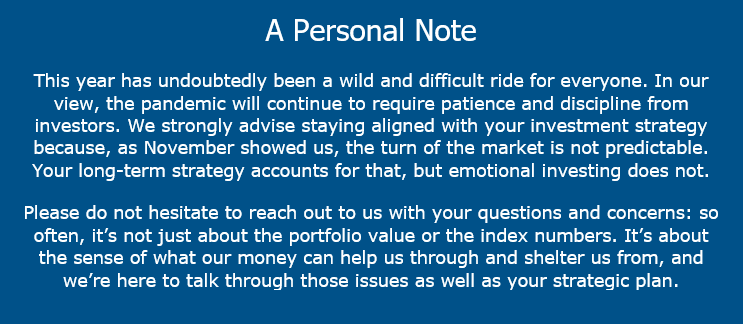December 4 2020 Market Update
Markets Surge Past Uncertainty
November brought a new surge in COVID-19 caseloads and the possibility of further government shutdowns (at this writing, on December 3rd, a new stay-at-home order went into effect in California).1
 This brings a renewed level of uncertainty to the economic recovery, especially when combined with expiring federal unemployment benefits and the absence of additional stimulus. Despite positive news around potential vaccine approvals and availability,2 we still face a number of unknowns going into year-end and 2021.
This brings a renewed level of uncertainty to the economic recovery, especially when combined with expiring federal unemployment benefits and the absence of additional stimulus. Despite positive news around potential vaccine approvals and availability,2 we still face a number of unknowns going into year-end and 2021.
Despite this backdrop, markets surged in November. The Dow Jones Industrial Average had its best month since 1987, rising 12% to hit 30,000 for the first time in history, while the S&P 500 rose 11%.3
There’s a lot to understand here, so let’s take it one issue at a time.
Why Are Markets Doing So Well?
One question that comes up a lot is why markets are doing well when uncertainty and risk is so pronounced in the overall economy.
You’ve probably heard this before, but it’s always good to keep in mind that the market is not the same as the current status of the economy. While it’s easy to think of markets as a barometer for the overall health of the country, it’s just not that simple. The makeup of the S&P 500 is significantly different than the makeup of the overall economy. We’ve covered the proportion of technology in the S&P 500 before, and that difference between the S&P 500 and the overall economy is significant here as well.

Another important note to keep in mind: volatility can go both up or down. These types of significant moves – in either direction, as we saw in March – can be reversed, sometimes at surprising speed. Historically, this tends to favor investors over longer periods, which is especially important to keep in mind during periods with sharp drops.4

At this time, the market appears to be looking ahead to the potential for vaccine approval and distribution. The news here is, so far, promising. The Food and Drug Administration (FDA) is currently scheduled to meet on December 10th to discuss the merits of the Pfizer/BioNTech vaccine, which has just been approved for distribution in the United Kingdom.5
To that end, we could see a continued run upwards. However, if the news or sentiment turn, or if issues with a vaccine or other delays arise, we could see the reverse.
The Incoming Biden Administration
We’ll see another set of new variables come January, with the inauguration of President-elect Joe Biden and the Georgia runoff for control of the Senate. Outside of the usual handicapping of legislative outcomes, these two events could carry significant implications when it comes to federal support for the economy.
Currently, there are some movements in Congress to provide stimulus by year-end,6 but given the start-stop progress of these discussions so far, we don’t think we can count on it yet.
On the other hand, if majority control of the Senate shifts to Democrats in January, we could see a significantly boosted level of federal stimulus in future legislation. Even if the status quo is maintained, we believe it’s likely that president-elect Joe Biden’s economic team is likely to push for expanded economic support, particularly for low and middle-class workers.7
What Does This Mean For You?
We all want the pandemic to be over, but at this time it’s apparent that we’re not through it yet. With caseloads jumping across the US and Europe, the probability of shutdowns and economic fallout are also rising. At the same time, while volatility favored investors in November, we are still facing enough uncertainty that we would not discount the possibility of a reversal in the next few months.
That said, the vaccine news is incredibly positive, not only for sentiment and morale but also for the economy. If we can see widespread distribution and adoption of the vaccine, we could see some return to normalcy hopefully in the next year.
This year has undoubtedly been a wild and difficult ride for everyone. In our view, the pandemic will continue to require patience and discipline from investors. We strongly advise staying aligned with your investment strategy because, as November showed us, the turn of the market is not predictable. Your long-term strategy accounts for that, but emotional investing does not.
Please do not hesitate to reach out to us with your questions and concerns: so often, it’s not just about the portfolio value or the index numbers. It’s about the sense of what our money can help us through and shelter us from, and we’re here to talk through those issues as well as your strategic plan.

Securities are offered through Mid Atlantic Capital Corporation (“MACC”) a registered broker dealer, Member FINRA/SIPC.
Investment advice is offered through JSF Financial, LLC, which is not a subsidiary or control affiliate of MACC.
Confidentiality Note: This email communication including all attachments transmitted with it may contain confidential information intended solely for the use of the addressee. If the reader or recipient of this communication is not the intended recipient, or you believe that you have received this communication in error, please notify the sender immediately by return email or by telephone at (323) 866-0833 and PROMPTLY delete this email including all attachments without reading them or saving them in any manner. The unauthorized use, dissemination, distribution, or reproduction of this email, including attachments, is strictly prohibited and may be unlawful.
The information expressed herein are those of JSF Financial, LLC, it does not necessarily reflect the views of Mid Atlantic Capital Corporation (MACC). Neither JSF Financial LLC nor MACC gives tax or legal advice. All opinions are subject to change without notice. Neither the information provided, nor any opinion expressed constitutes a solicitation or recommendation for the purchase or sale of any security. Investing involves risk, including possible loss of principal. Indexes are unmanaged and cannot be invested in directly.
Historical data shown represents past performance and does not guarantee comparable future results. The information and statistical data contained herein were obtained from sources believed to be reliable but in no way are guaranteed by JSF Financial, LLC or MACC as to accuracy or completeness. The information provided is not intended to be a complete analysis of every material fact respecting any strategy. The examples presented do not take into consideration commissions, tax implications, or other transactions costs, which may significantly affect the economic consequences of a given strategy. Diversification does not ensure a profit or guarantee against loss. Carefully consider the investment objectives, risks, charges and expenses of the trades referenced in this material before investing.
Asset Allocation and Diversification do not guarantee a profit or protect against a loss.
The Bloomberg Barclays U.S. Aggregate Bond Index measures the investment-grade U.S. dollar-denominated, fixed-rate taxable bond market and includes Treasury securities, government-related and corporate securities, mortgage-backed securities, asset-backed securities and commercial mortgage-backed securities.
The S&P 500 Index is an unmanaged, market value-weighted index of 500 stocks generally representative of the broad stock market.
The MSCI World Index is a broad global equity index that represents large and mid-cap equity performance across 23 developed markets countries and covers approximately 85% of the free float-adjusted market capitalization in each country.
The MSCI Europe Index captures large and mid cap representation across 15 Developed Markets countries in Europe and covers approximately 85% of the free float-adjusted market capitalization across the European Developed Markets equity universe.
The MSCI Emerging Markets Index captures large and mid-cap representation across 26 emerging markets countries and covers approximately 85% of the free float-adjusted market capitalization in each country.
Gross domestic product (GDP) is a monetary measure of the market value of all the final goods and services produced in a specific time period.
GDP is the most commonly used measure of economic activity.
Sources:
1: https://covid19.ca.gov/stay-home-except-for-essential-needs/
3: https://www.wsj.com/articles/global-stock-markets-dow-update-11-30-2020-11606732360
4: JP Morgan Guide to the Markets, as of November 30, 2020.
5: https://www.wsj.com/articles/fda-head-defends-covid-19-vaccine-approval-process-11606954168
7: https://www.nytimes.com/2020/11/30/business/biden-economics-yellen-labor.html and https://www.wsj.com/articles/biden-to-name-rouse-tanden-to-economic-team-11606684256
Performance table sources:
BBAB: https://performance.morningstar.com/Performance/index-c/performance-return.action?t=XIUSA000MC
